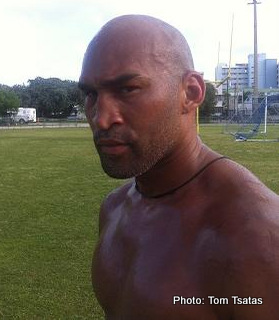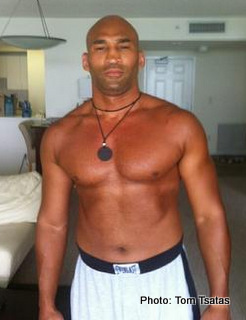
Oquendo, born in Puerto Rico and raised in Chicago, is revitalizing a career that was sidelined by two controversial losses in 2010. First, in Paris, Oquendo easily dominated France’s Jean-Marc Mormeck only to lose the decision after ten rounds. The incomprehensible verdict was excoriated by media and fans worldwide. Months later, Oquendo met Oliver McCall in the latter’s hometown of Hollywood, Florida. Although he appeared to win a lopsided majority of the bout’s 12 rounds, Oquendo again lost a decision. These reversals set Oquendo back immensely. World rated and a viable candidate for an elimination match at the beginning of 2010, he finished the year bereft of his minor titles, dropped from the rankings, and without prospects for a meaningful fight..
Known as boxing’s “hard luck heavyweight,” Oquendo has a long history of losing decisions that most observers feel he really won. Five of his seven career defeats are hotly disputed decisions that occurred in his opponent’s hometown, or in television bouts against star boxers who, because of their marketability, enjoyed the patronage of boxing’s powerbrokers. In each of these fights, Oquendo faced a “house” fighter who received the benefit of the doubt from judges. Understandably, Oquendo is relieved to be fighting on friendly turf this Friday: the card is produced by his long-term promoter Bobby Hitz, and staged at his home venue, the Horseshoe Casino.
The Puerto Rican fighter clearly appreciates his recent change in luck. He knows that beating Abell will position him for a big match against another contender, or possibly lead to a world title fight. When asked to comment on Friday’s match, his first statement was, “I want to thank George Martinez of WBA for giving me this chance.” Oquendo added, “I’m gonna get that WBA Fedlatin belt back. That’s my old title that I won back in 2003. I’ll be back in the title picture after this.”
Although he is 39 years old, Oquendo remains a much avoided heavyweight. Now, as in the past, many heavyweights do not want to risk defeat by fighting him. Hitz and manager Tom Tsatas, in fact, had difficulty finding a willing and worthy opponent for Friday’s fight. In a statement to the press, Hitz explained, “We sent challenges out to a bunch of guys. Chris Arreola, Bryant Jennings, Seth Mitchell, the list goes on, and none of them are willing to fight him.” Tsatas spent a month calling the handlers of many reputable heavyweights, always getting the same replies. “They won’t let their guy in the ring with Fres, or they are only willing to fight him in their own hometown,” he said. “These guys just want to go 12 rounds without getting knocked out by Fres, so they can finish on their feet and count on their promoter to have the decision fixed.”

Only Miami trainer Orlando Cuellar and his boxers proved cooperative. “Orlando’s a true gentleman,” said Oquendo. He called us back, and he came by our gym. He lined up three fighters, including the English amateur star Jovan Young.” Oquendo reports that his sessions with Young were especially beneficial, as Young, like Abell, is a southpaw. That Oquendo has benefited from the sparring is obvious from his communication. In telephone conversations with this correspondent, the Boricua fighter exuded supreme self-confidence, mental focus, and energy. He is obviously primed for combat.
Many fans may wonder why Oquendo, a boxer close to middle age, inspires other heavyweights to cut him a wide birth, both in real fights and in sparring. The perception (among these fight aficionados) is that Oquendo should have beaten Mormeck and McCall in spite of the judges, and that he is an aging boxer in the terminal phase of a lengthy pro career. But the reality does not validate the perception. In truth, heavyweights have legitimate reasons for ducking Oquendo. They realize that Oquendo could set back their careers in an actual fight, and that he can break their egos in the gym.
Overlooked by most is that physically and athletically, Oquendo is a well-preserved fighter. His legs retain the springlike qualities characteristic of younger athletes, and he is able to dart in and out of punching range with ease. If necessary, he can still dance on his toes to dodge attacks. Oquendo’s hand speed has deteriorated only minimally, and his jab remains fast, straight, and razor sharp. A fine defensive fighter who has not taken much punishment in his career, Oquendo is not shopworn. He seems to have retained the same split-second reactions that he possessed ten years ago. These days, there is a small but growing group of heavyweights who are effective on the world level despite being around 40 years old (or older): Oquendo is one of them.
Most threatening about Oquendo, perhaps, is that he is tricky and packs power in his overhand right. Here, the observations of Oliver McCall are particularly informative. This correspondent witnessed the Oquendo-McCall fight from ringside, and noticed that McCall became cautious anytime he had Oquendo covering up. Afterwards, McCall was asked why he did not press his attack during those moments. McCall replied, “There’s something you need to understand about him…he can hit with that right hand. He was trying to get me to open up, because he had that right hand cocked. I had to be careful.”
On Friday, Oquendo will need to put his athleticism, cageyness, and right-handed power to work because he is facing a fighter who has a puncher’s chance against anyone. Although Abell has fought most of his bouts on the club circuit and has never been world-rated, he is a gritty fighter who must not be underestimated. Noteworthy is that Abell – who has 27 knockouts among his 28 career victories – fought many times at Philadelphia’s notoriously tough Blue Horizon arena early in his career. In press releases, Hitz has accurately described Abell as “the only one with the balls to step up. He can crack.”
But Oquendo relishes the challenge that Abell presents. Notably, the Boricua draws confidence from past experience sparring with Abell. ““He’s a former sparring partner, a tough kid from Minnesota,” states Oquendo. “He’s a very hard hitter, and has decent talent. He’s helped me before, and I helped him prepare for Arreola. I was giving him such great workouts that he sent the rest of his sparring partners home.” With a laugh, Oquendo added, “But I think I softened him up for Arreola.”
“I always perform well against big punchers, like Cliff Ettiene and Demetrice King,” Oquendo notes. “And I have a great record against lefties. I’m in great condition. I’ve been running, doing my sprints. I’m ready.”